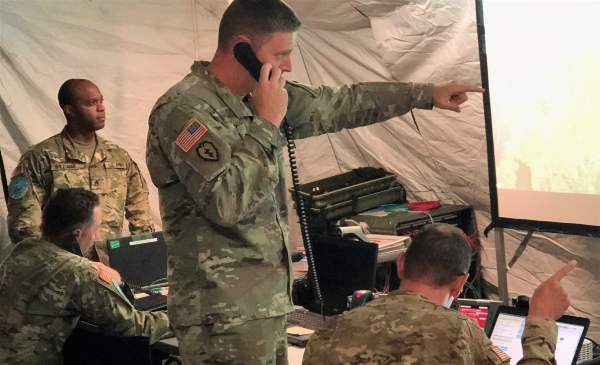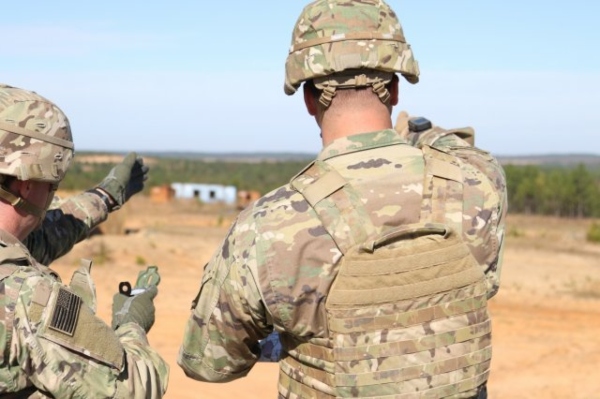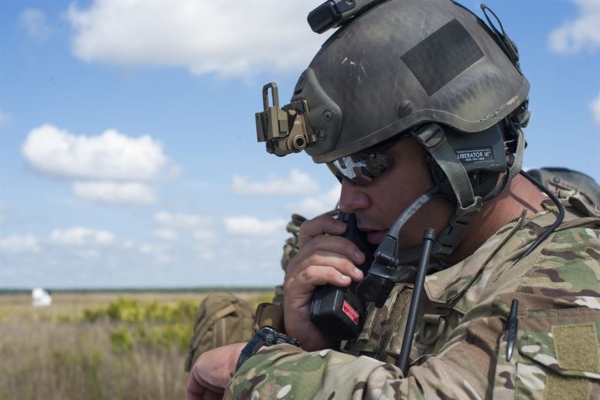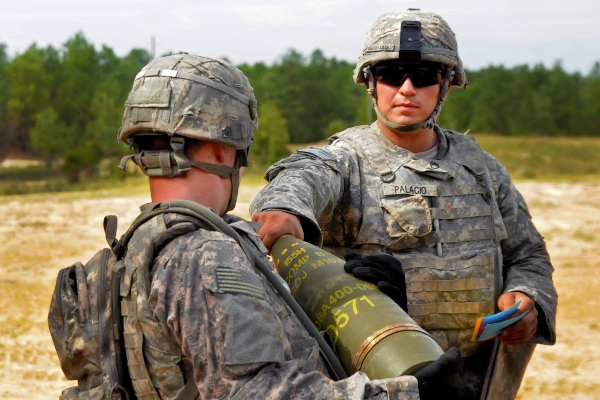Army Fire Control Specialists (MOS 13J) integrate and process tactical battlefield information.
A 13J MOS processes the information from multiple users and sensors provided by a network of Army and JOINT automated battle command systems.
An Army Fire Control Specialist (MOS 13J) is similar to MOS 13F Army Joint Fire Support Specialist with a few distinctions.
Related Article – Army MOS List: A List Of All 159 Army Jobs
Education, Qualifications, and Training

Fire Control Specialists (MOS 13J) have an important role in the U.S. Army.
MOS 13J is comparable to an Army Joint Fire Support Specialist (MOS 13F) in that they work as part of a greater artillery support team.
Both Military Occupation Specialties (MOS) in the Army are more dedicated to the data and analytics of the artillery team yet work side-by-side with the team in conflict while they support ground infantry and tank systems.
Education
Are you interested in becoming an Army Fire Control Specialist?
The first step is to complete the Armed Services Vocational Aptitude Battery (ASVAB) after speaking with an Army Recruiter.
MOS 13J needs to complete a Field Artillery (FA) score of at least 93 to remain considered for the military specialty.
The other subtests you’ll need to complete for MOS 13J include arithmetic reasoning (AR), coding speed (CS), mechanical comprehension (MC), and mathematics knowledge (MK).
If you score slightly higher (FA: 96), you can also have the option of deciding between MOS 13J and MOS 13F.
Qualifications
Army Fire Control Specialists need to receive special clearance from the U.S. Military.
After passing the ASVAB, you will receive a thorough investigation from the U.S. Army that looks into character and personal conduct.
The investigation will consider your criminal record, personal finances, and overall stability to determine whether or not you are eligible to become an Army Fire Control Specialist.
It is important to mention that a history of alcohol or drug abuse could result in you being disqualified for becoming 13J MOS.
Additionally, color vision with the ability to discern between red and green is required for this MOS.
You will also need full finger dexterity in both hands and the ability to hear and understand human voices through headphones and handsets.
The Army also mentions that it helps to have an interest in cannon and rocket operations.
The role of 13J MOS is demanding so it serves you to work well in a team setting, demonstrate the ability to multi-task, and perform well under pressure.
There are also physical and mental demands of an Army Fire Control Specialist (MOS 13J).
Training
Army recruits begin training for MOS 13J like all other recruits through Basic Combat Training, or boot camp.
Then, recruits interested in Army Fire Control Specialist progress to Advanced Individual Training (AIT).
AIT generally lasts 7 weeks for Army Fire Control Specialists and takes place at Fort Sill, Oklahoma.
You will learn how to operate guns, missile and rocket systems, compute target locations, and understand artillery tactics.
There is also in-classroom learning related to artillery tactics, techniques, and procedures.
Fire Control Specialists need to know how to compute target locations so along with MOS 13F, they will learn more about these practices as well.
What does an Army Fire Control Specialist Do?

Fire Control Specialists are part of a larger Army field artillery team.
Artillery in the U.S. Army includes anything where large ammunition is fired such as rockets or missiles.
The objective of the Army artillery team is to assist and support the ground infantry while in combat as well as tank units.
Army Fire Control Specialists (MOS 13J) commonly support Army Joint Fire Support Specialists (MOS 13F) out in the field with intelligence operations related to target processing and brigade maneuvers.
Related Article – Green Berets Vs. Army Rangers: 5 Major Differences
Communication Systems
Communication between Army field artillery teams and ground infantry is important during military operations.
Ground infantry and tank units need support for the artillery for survival in battlefield conflict.
As a result, Army Fire Control Specialists communicate and coordinate artillery strikes to gain a favorable edge out in the field.
MOS 13J regularly assists MOS 13F with encoding and decoding messages, as well as establishing radio wire communications and speech security equipment.
Tactical Data System Operations
Information is knowledge.
Army Fire Control Specialists are well aware of this power where they process critical tactical data systems to gain an analytical advantage over the opponent.
Soldiers in MOS 13J will use laser range finders, night observation devices, and other target designation equipment to locate targets.
They also assist in the training of subordinates in support procedures and tactics of the artillery team.
Depending on the rank, some specialists may also lead and train the forward observer team in combat operations.
Database Management
Army Fire Control Specialists, like MOS 13F, spend a lot of time doing clerical work.
There is a need for specialists to manage the database of important information such as target lists and capability overlaps.
MOS 13J also assists MOS 13F in preparing fire support situation plans and maps.
There is also a need for processing fire mission data.
What does an Army Fire Control Specialist make?

Army Fire Control Specialists do not receive a special salary.
Instead, pay is dictated based on Army rank (see table, below) and years of service in the U.S. Armed Forces.
It is important to note that the monthly base salary also includes housing, medical, special pay, PTO (paid time off), food, and housing (more information, below).
Additionally, you could earn up to $40,000 in cash bonuses by enlisting in certain MOS positions, especially in hazardous or dangerous places.
| Insignia | Pay Grade | Rank | Abbreviation | Minimum Monthly Pay |
|---|---|---|---|---|
| E-1 +4 months | Private | PVT | $1,917.60 | |
| E-2 | Private Second Class | PV2 | $2,149.20 | |
| E-3 | Private First Class | PFC | $2,259.90 | |
| E-4 | Specialist | SPC | $2,503.50 | |
| E-4 | Corporal | CPL | $2,503.50 | |
| E-5 | Sergeant | SGT | $2,730.30 | |
| E-6 | Staff Sergeant | SSG | $2,980.50 | |
| E-7 | Sergeant First Class | SFC | $3,445.80 | |
| E-8 | Master Sergeant | MSG | $4,957.20 | |
| E-8 | First Sergeant | 1SG | $4,957.20 | |
| E-9 | Sergeant Major | SGM | $6,055.50 | |
| E-9 | Command Sergeant Major | CSM | $6,055.50 | |
| E-9 | Sergeant Major of the Army | SMA | $6,055.50 |
Benefits
The Army has several benefits included with a monthly salary:
- Medical Insurance
- Vacation Time
- Special Pay
- Retirement
- Housing: Allowances for living expenses, utilities, and maintenance.
- Food: Allowance for the on-base dining hall and access to tax-free department and grocery stores
- Education: Army members can earn full tuition, merit-based scholarships, allowances for books and fees, plus an annual stipend for living expenses.
Related Article – Army Ranks and Pay
Job Reviews
The reviews on Indeed.com for Army Fire Control Specialist (MOS 13J) are dependably positive.

One reviewer did mention that your overall satisfaction or dissatisfaction with the Army and MOS 13J can depend on your superiors as well as where you are stationed:

Learning leadership skills and performing well under stressful circumstances are two of the assets that are hard to teach in other fields of employment and many consider a career in the U.S. Military:

Civilian Job Opportunities
There is no direct civilian career equivalent of an Army Fire Control Specialist (13J MOS).
Regardless, the skills you attain while serving in the U.S. Army are practical in a number of lines of work.
The experience you receive dealing with various computer and communication systems can help you land a job as a telecommunication specialist or computer programmer.
Summary
Army Fire Control Specialists (MOS 13J) work alongside Army Joint Fire Support Specialists (MOS 13F) and other members of the artillery team.
They serve more of the information gathering and intelligence needed to support the rest of the artillery team.
The role requires the ability to process and integrate tactical battlefield information in high-pressure situations.
Resources:
- https://www.goarmy.com/careers-and-jobs/browse-career-and-job-categories/combat/fire-control-specialist.html
- https://www.indeed.com/cmp/U.S.-Army/reviews?fjobtitle=Controls+Engineer&fcountry=ALL
- 68 Series MOS: A List of Medical Field Jobs in the Army - June 19, 2024
- 15 Series MOS: US Army Aviation Jobs - June 19, 2024
- 11 General Orders For Each Military Branch - June 19, 2024
General FAQ
What does an Army Fire Control Specialist (MOS 13J) do?
Army Fire Control Specialists (MOS 13J) integrates and processes tactical information on the battlefield with the use of communications and automated battle command systems.
What ASVAB score do I need to be an Army Fire Control Specialist?
An Army Fire Control Specialty requires a Field Artillery score of 93. If you score a 96, you can choose between Fire Control (13J) and Joint Fire Support (MOS 13F).
How long is training to become an Army Fire Control Specialist?
After 10 weeks at Basic Training, an Army Fire Control Specialists trains for 7 to 8 weeks at Fort Sill, Oklahoma.
How much does an Army 13J make?
Like all Army personnel, Army Fire Control Specialists are paid according to rank and time in service. They may also be eligible for enlistment bonuses for MOS 13J.
What jobs can an Army 13J get in the civilian world?
Experience with communications and computer systems may provide training for civilian jobs in programming and telecommunications.
Originally posted on September 26, 2019 @ 7:12 pm
Affiliate Disclosure: This post may contain affiliate links. If you click and purchase, I may receive a small commission at no extra cost to you. I only recommend products I have personally vetted. Learn more.
